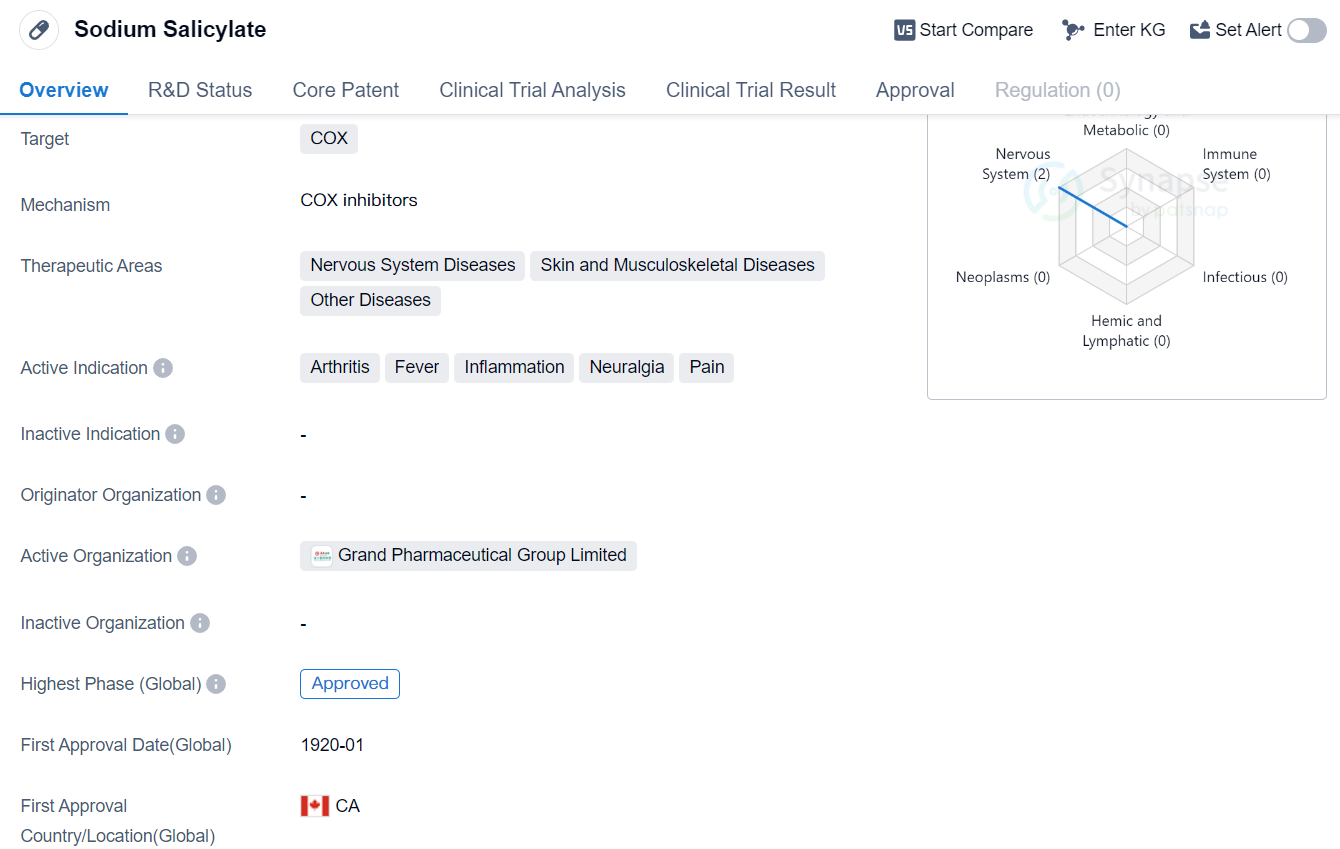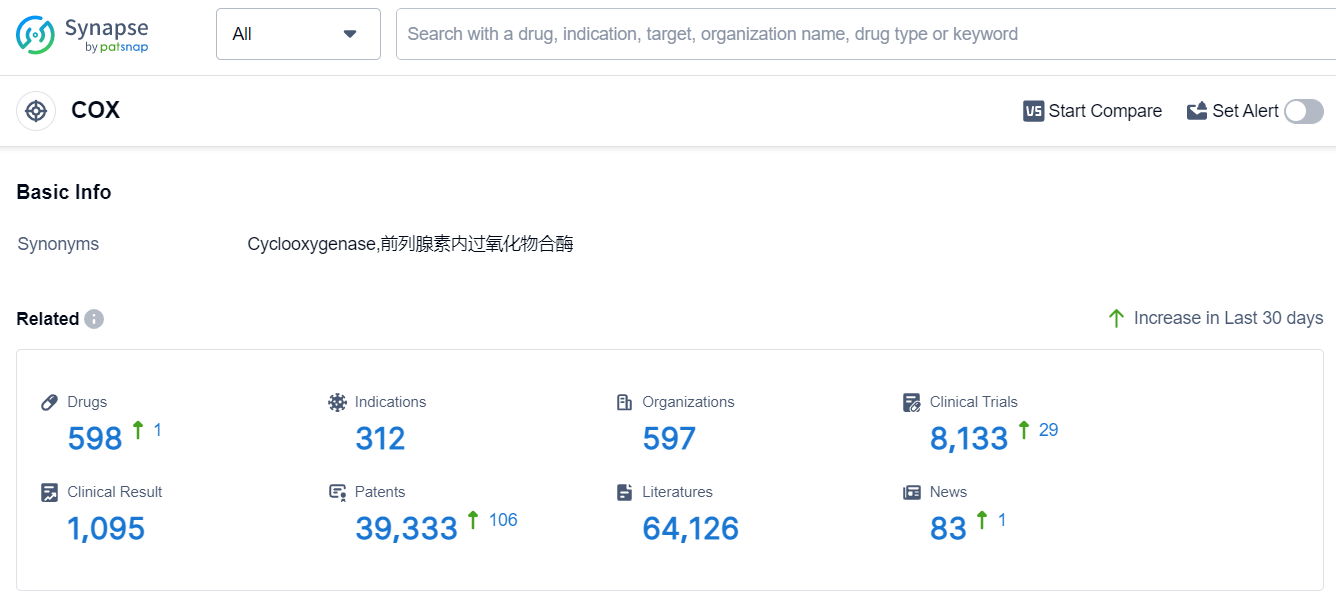Deep Scientific Insights on Sodium Salicylate's R&D Progress, Mechanism of Action, and Drug Target
Sodium Salicylate's R&D Progress
Sodium Salicylate is a small molecule drug that primarily targets COX, an enzyme involved in the production of prostaglandins, which are responsible for inflammation and pain. This drug has been approved for use in various therapeutic areas, including Nervous System Diseases, Skin and Musculoskeletal Diseases, and Other Diseases.
The active indications for Sodium Salicylate include Arthritis, Fever, Inflammation, Neuralgia, and Pain. It is commonly used to alleviate symptoms associated with these conditions. Sodium Salicylate has been approved for use in multiple countries, with its first approval granted in Canada in January 1920.
As a small molecule drug, Sodium Salicylate is chemically synthesized and typically administered orally. It is known for its anti-inflammatory and analgesic properties, making it an effective treatment option for various inflammatory and painful conditions. The drug works by inhibiting the COX enzyme, thereby reducing the production of prostaglandins and subsequently alleviating inflammation and pain.
Sodium Salicylate's approval in multiple countries, including China, indicates its widespread recognition and acceptance as a therapeutic option. Its long history of use, with the first approval dating back to 1920, further highlights its established position in the pharmaceutical industry.
The drug's therapeutic areas of focus, including Nervous System Diseases, Skin and Musculoskeletal Diseases, and Other Diseases, suggest its versatility in treating a range of conditions beyond just arthritis and pain. This broad applicability may contribute to its continued relevance and use in the medical field.
👇Please click on the image below to directly access the latest data (R&D Status | Core Patent | Clinical Trial | Approval status in Global countries) of this drug.
Mechanism of Action for Sodium Salicylate: COX inhibitor
COX inhibitors are a class of drugs that target the enzyme cyclooxygenase (COX). COX is responsible for the production of prostaglandins, which are hormone-like substances involved in inflammation, pain, and fever. By inhibiting COX, these drugs reduce the production of prostaglandins, leading to anti-inflammatory, analgesic (pain-relieving), and antipyretic (fever-reducing) effects.
From a biomedical perspective, COX inhibitors are commonly used in the treatment of various conditions, including arthritis, menstrual cramps, headaches, and acute pain. They can be classified into two main types: nonsteroidal anti-inflammatory drugs (NSAIDs) and selective COX-2 inhibitors.
NSAIDs, such as aspirin, ibuprofen, and naproxen, inhibit both COX-1 and COX-2 enzymes. They are widely available over-the-counter and are effective in relieving pain and inflammation. However, they may also cause side effects such as stomach ulcers and gastrointestinal bleeding.
Selective COX-2 inhibitors, such as celecoxib, specifically target the COX-2 enzyme while sparing COX-1. This selectivity reduces the risk of gastrointestinal side effects but may still carry a small risk of cardiovascular events. These drugs are often prescribed for chronic conditions like osteoarthritis and rheumatoid arthritis.
Overall, COX inhibitors play a crucial role in managing pain, inflammation, and fever by blocking the production of prostaglandins through inhibition of the COX enzyme. It is important to note that the use of COX inhibitors should be done under medical supervision, considering individual patient factors and potential side effects.
Drug Target R&D Trends for Sodium Salicylate
The current competitive landscape for target COX is characterized by the dominance of companies like GSK Plc, Viatris Inc., and Pfizer Inc., which have successfully advanced multiple drugs to the approved phase. The most common indications for these drugs are pain, common cold, rheumatoid arthritis, and osteoarthritis. Small molecule drugs are the primary focus of research and development, indicating a preference for this drug type. China, the United States, and Japan are leading in terms of drug development, with China showing significant progress in both approved and preclinical drugs. Overall, the target COX market is competitive, with a focus on addressing pain-related conditions and developing small molecule drugs.
According to Patsnap Synapse, as of 17 Sep 2023, there are a total of 598 COX drugs worldwide, from 597 organizations, covering 312 indications, and conducting 8133 clinical trials.
Please click on the picture link below for free registration or log in directly if you have a freemium account, you can browse the latest research progress on drugs, indications, organizations, clinical trials, clinical results, and drug patents related to this target
Conclusion
In summary, Sodium Salicylate is a small molecule drug that targets COX and has been approved for use in various therapeutic areas. Its active indications include Arthritis, Fever, Inflammation, Neuralgia, and Pain. With its first approval in Canada in 1920, Sodium Salicylate has a long history of use and is recognized globally as an effective treatment option. Its widespread acceptance and versatility in treating different diseases make it a valuable asset in the pharmaceutical industry.






